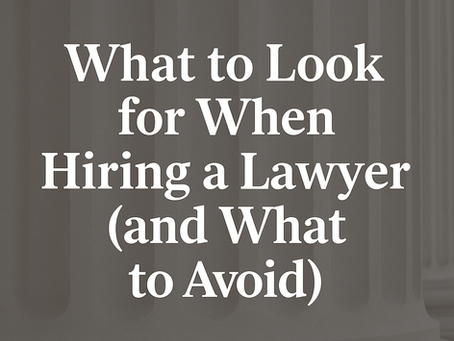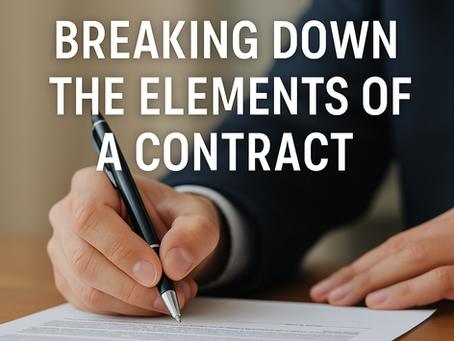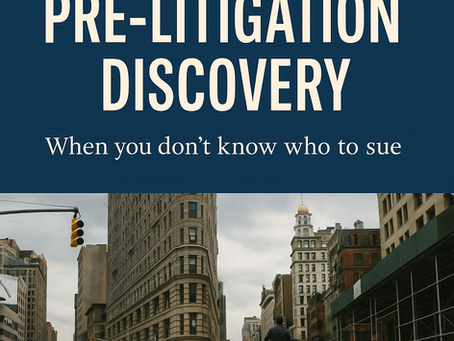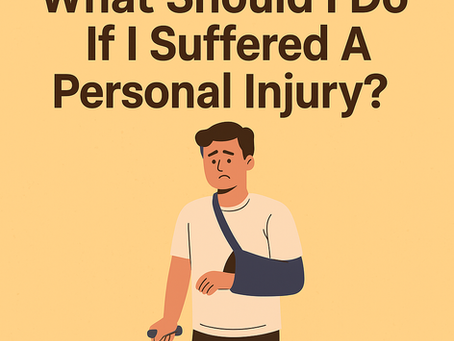top of page
Search


DOJ’s Emerging Whistleblower Program: How It Works and What It Means for Corporate Compliance
The Department of Justice (DOJ) has signaled and begun rolling out a whistleblower rewards framework aimed at incentivizing insiders and third parties to report corporate crime directly to prosecutors. While the program will continue to evolve through policy and rulemaking, its contours already create immediate implications for New York–based and U.S.-operating companies
Dennis Sapien-Pangindian
Nov 5, 20255 min read


How Outside General Counsel Supports Corporate Governance
An OGC acts as a strategic advisor — helping boards navigate their responsibilities while reducing the risk of governance missteps. Here’s how:
Dennis Sapien-Pangindian
Oct 17, 20253 min read


How Outside General Counsel Services Improve Contract Management and Risk Mitigation
For growing businesses, contracts are the foundation of nearly every relationship — from clients and vendors to employees and investors. Yet, many small and mid-sized companies treat contract management as an afterthought until something goes wrong. That’s where Outside General Counsel (OGC) services come in.
Dennis Sapien-Pangindian
Oct 17, 20253 min read


What Does an Outside General Counsel Do — and When Should You Hire One?
As your business grows, legal questions start to multiply. Contracts get more complex. Employment laws change. Regulatory requirements sneak up. Before long, what used to be a quick “ask my lawyer” moment becomes a full-time job.
Dennis Sapien-Pangindian
Oct 17, 20253 min read


Assessing Legal and Compliance Risks: A Guide for Business Owners
Every business faces risk — but not all risks come from competitors, market shifts, or economic downturns. Some come from within: legal and compliance risks that can quietly grow until they trigger lawsuits, fines, or regulatory investigations.
Dennis Sapien-Pangindian
Oct 17, 20253 min read


Small Claims Court: A Practical Guide for Business Owners
When a customer doesn’t pay, a vendor breaches a contract, or a dispute over a few thousand dollars threatens your bottom line, hiring a full legal team might feel like overkill. That’s where small claims court comes in — a streamlined, lower-cost way to resolve smaller disputes.
Dennis Sapien-Pangindian
Oct 6, 20253 min read


What Should I Do If I Receive a Subpoena? A Business Owner’s Guide
Getting served with a subpoena can be stressful — especially if you’ve never seen one before. Whether you’re an individual, a small business, or a company executive, a subpoena means one thing: someone wants information from you for a legal case.
Dennis Sapien-Pangindian
Oct 6, 20253 min read


What to Look for When Hiring a Lawyer (and What to Avoid)
For business owners, hiring the right lawyer can make the difference between a thriving, protected business and one exposed to unnecessary risk. Whether you’re dealing with contracts, compliance, disputes, or growth, your lawyer isn’t just a service provider—they’re a partner. But how do you know who’s the right fit for you?
Dennis Sapien-Pangindian
Sep 23, 20252 min read


Breaking Down the Elements of a Contract
Contracts are the backbone of business. Whether you’re signing a lease, negotiating a vendor agreement, or onboarding a new client, contracts define the rights and responsibilities of everyone involved. But what exactly makes a contract legally enforceable—and what are all those dense sections lawyers include? Here’s a plain-English guide to the core elements of a contract and the technical parts you’ll commonly see in written agreements.
Dennis Sapien-Pangindian
Sep 22, 20253 min read


10 Smart Questions to Ask During a Legal Consultation
Hiring an attorney is a major decision—one that can shape the outcome of your case or business issue. Whether you're facing litigation,...
Dennis Sapien-Pangindian
Jul 28, 20252 min read


How Pre-Litigation Discovery Can Help Identify the Right Defendant
Pre-litigation discovery is a process that allows a potential plaintiff to obtain evidence before filing a lawsuit. Its goal is to identify the right defendant or to preserve key evidence that may be lost over time. Courts can authorize limited discovery—like subpoenas to third parties or depositions—if you can show that it's necessary to establish the identity of a defendant or to support a future claim.
Dennis Sapien-Pangindian
Jul 28, 20252 min read


What Should I Do If I Suffered A Personal Injury?
Accidents happen—on the road, at work, in stores, or even on someone else’s property. If you’ve been injured due to someone else’s negligence, you may be entitled to compensation. But what you do in the hours and days after an injury can make or break your personal injury claim.
Here’s what you should do if you believe you have a personal injury case—and why every step matters.
Dennis Sapien-Pangindian
Jul 14, 20252 min read


Know Your Rights - Or Lose Them
In the wake of heightened civil unrest, viral videos of police misconduct, and increasing public demonstrations, it’s more important than ever to know your constitutional rights. But in moments of stress—when you’re pulled over, stopped by police, or protesting in the street—it’s also easy to forget what those rights are and how to use them.
Dennis Sapien-Pangindian
Jun 10, 20254 min read


What If I'm the One Getting Sued?
eing served with a lawsuit is one of the most stressful moments a person or business can experience. Whether you expected it or it comes as a total surprise, that knock on the door or envelope from a process server can feel overwhelming. The legal system is complex, and the idea of defending yourself in court might raise all kinds of questions and fears.But here’s the good news: lawsuits follow a process, and there are clear steps you can take to protect yourself, your busine
Dennis Sapien-Pangindian
Jun 2, 20253 min read


I Won! Now What?
Winning a lawsuit is no small feat. After months—or even years—of preparing, arguing, and navigating the court system, hearing the judge or jury rule in your favor can feel like a long-awaited breath of relief. But for many, the end of the trial is not the end of the story. In fact, it may just be the beginning of a new chapter: collecting what you’ve been awarded.Whether your judgment is monetary or involves some other form of relief, the court does not automatically enforce
Dennis Sapien-Pangindian
Jun 2, 20253 min read


What Actually Happens at Trial?
Trial is often portrayed as the dramatic conclusion of a legal battle—the moment when the truth is revealed, justice is served, and one side walks away vindicated. But for those unfamiliar with the courtroom, it’s easy to underestimate how structured, strategic, and high-stakes a trial really is. This post breaks down the key phases of a trial and illustrates each with famous cases to give you a vivid sense of what really goes on once a case reaches the courtroom.
Dennis Sapien-Pangindian
Jun 2, 20253 min read


What Is Discovery?
Once a lawsuit has begun, both sides enter the discovery phase. Discovery is the process by which parties exchange information relevant to the case. It ensures that both sides have access to the facts and can prepare for trial effectively.
Dennis Sapien-Pangindian
May 27, 20252 min read


What Happens When You File a Complaint?
Filing a complaint is the formal beginning of a lawsuit. It signals that informal efforts to resolve a dispute have been exhausted or deemed insufficient, and it sets the legal process in motion within the court system. Here is a quick breakdown of what a complaint is and what happens when you file one.
Dennis Sapien-Pangindian
May 27, 20252 min read


What Happens in the Pre-Litigation Stage of Disputes?
Before any lawsuit is filed, there's a phase known as pre-litigation. This stage is often overlooked but plays a critical role in shaping the direction and outcome of a dispute. It involves investigation, strategy planning, and negotiation—all with the goal of either resolving the issue without court involvement or preparing for a strong legal case if necessary.
Dennis Sapien-Pangindian
May 27, 20252 min read


What Are My Settlement Options—And When Should I Consider Them?
When a legal dispute arises, heading to court might feel like the obvious move—but it’s not the only one. Many disputes can be resolved more efficiently, cost-effectively, and privately through settlement. But understanding how settlement works, what options are available, and when to consider them is key to making a smart decision.
Dennis Sapien-Pangindian
May 21, 20253 min read
Asked and Answered: A Law Blog
bottom of page
